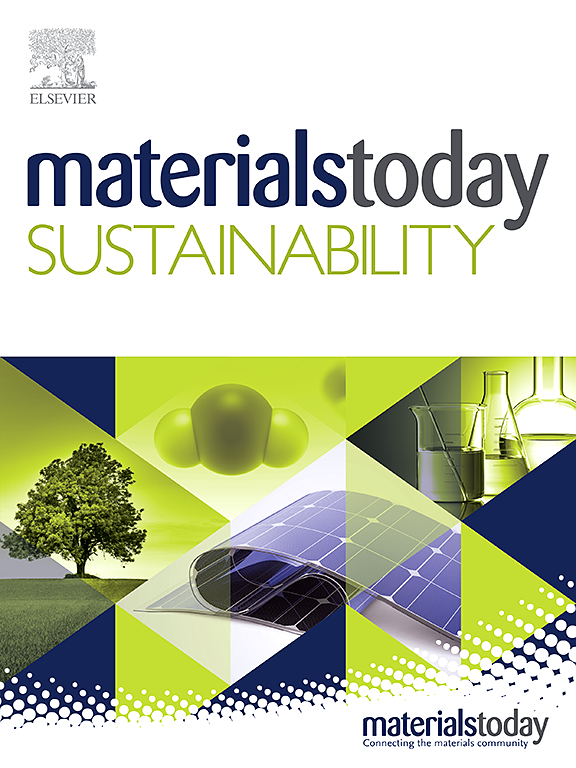Recent developments in CO2 permanent storage using mine waste carbonation
IF 7.1
3区 材料科学
Q1 GREEN & SUSTAINABLE SCIENCE & TECHNOLOGY
引用次数: 0
Abstract
Accelerated climate change driven by human activities necessitates urgent measures to mitigate greenhouse gas emissions, particularly CO2. Mineral carbonation has gained traction due to its potential to sequester CO2 permanently in stable carbonate minerals. This review comprehensively examines recent advancements in utilising mine wastes for CO2 mineral carbonation, focusing on their feasibility, efficiency, and economic viability. Various mine wastes, including ultramafic, sedimentary, and iron-rich wastes, offer substantial CO2 sequestration potential due to their inherent mineral compositions conducive to carbonation reactions. The utilisation of mine wastes for CO2 mineral carbonation not only addresses the challenge of managing large volumes of mining by-products but also contributes to reducing atmospheric CO2 levels. Laboratory and field studies have demonstrated the effectiveness of direct and indirect carbonation processes, highlighting factors such as particle size, temperature, pressure, and mineralogy that influence carbonation efficiency. Despite the promising results, significant obstacles remain, including slow reaction kinetics, high energy and economic costs, and the need for scalable and sustainable solutions. This review identifies key research gaps and proposes strategies to enhance the economic feasibility and scalability of mine waste carbonation. Integrating carbonation processes with existing mining operations and waste management practices can provide synergistic benefits, reducing costs and environmental impacts. Future research should focus on optimising process parameters, developing novel catalysts, and exploring the potential of recovering valuable by-products during carbonation. By addressing these challenges, CO2 mineral carbonation using mine wastes can become a viable strategy for sustainable mine waste management and climate change mitigation.
利用矿山废物碳酸化技术永久储存二氧化碳的最新进展
人类活动导致的气候变化加速,需要采取紧急措施减少温室气体排放,特别是二氧化碳的排放。矿物碳酸化因其将二氧化碳永久封存在稳定的碳酸盐矿物中的潜力而受到关注。本文全面审查了利用矿山废弃物进行二氧化碳矿物碳化的最新进展,重点讨论了其可行性、效率和经济可行性。各种矿山废物,包括超镁铁质、沉积和富铁废物,由于其固有的矿物成分有利于碳酸化反应,提供了大量的二氧化碳封存潜力。利用矿山废物进行二氧化碳矿物碳化不仅解决了管理大量采矿副产品的挑战,而且有助于减少大气中的二氧化碳水平。实验室和现场研究已经证明了直接和间接碳化过程的有效性,强调了影响碳化效率的因素,如粒度、温度、压力和矿物学。尽管取得了可喜的成果,但仍存在重大障碍,包括反应动力学缓慢、能源和经济成本高,以及对可扩展和可持续解决方案的需求。本文指出了主要的研究空白,并提出了提高矿山废弃物碳酸化的经济可行性和可扩展性的策略。将碳化过程与现有的采矿作业和废物管理做法结合起来可以提供协同效益,降低成本和环境影响。未来的研究应集中在优化工艺参数,开发新型催化剂,探索回收碳化过程中有价值的副产物的潜力。通过应对这些挑战,利用矿山废物进行二氧化碳矿物碳化可以成为可持续矿山废物管理和减缓气候变化的一项可行战略。
本文章由计算机程序翻译,如有差异,请以英文原文为准。
求助全文
约1分钟内获得全文
求助全文
来源期刊

Materials Today Sustainability
Multiple-
CiteScore
5.80
自引率
6.40%
发文量
174
审稿时长
32 days
期刊介绍:
Materials Today Sustainability is a multi-disciplinary journal covering all aspects of sustainability through materials science.
With a rapidly increasing population with growing demands, materials science has emerged as a critical discipline toward protecting of the environment and ensuring the long term survival of future generations.
 求助内容:
求助内容: 应助结果提醒方式:
应助结果提醒方式:


